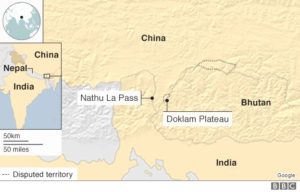
In the last few weeks, China has been blowing hot and cold over the India-China standoff at the tri junction Doklam (Bhutan)
On several occasions, the spokesman of China has warned India directly or indirectly that China would not hesitate to deploy its army and use force to settle the Doklam row. On most occasions, the statement from China amount to war cry and gives an impression as if China is itching for a war with India.
In spite of highly provocative statement from China, the government of India has handled the issue with firmness and dignity that seem to have further upset China, since India is not responding to the similar war cry.
Indian Foreign Minister Ms. Sushma Swaraj has declared in the Indian Parliament that war cannot be a solution for any problem and she firmly ruled out war as an option both for India and China. She further declared that India was negotiating with China not only on the Doklam row but the entire bilateral issues between India and China.
When several parliamentarians in India expressed concern and raised questions on the standoff with China, Indian Foreign Minister said that dialogue with China was the way out. She also called for patience and restraint in dealing with the war like situation that China has created and urged the Indian parliamentarians to have restraint in making their observations. Finally, she said clearly that India would keep patience to resolve the issue with China.
One is not sure as to whether China, in its present mood and with its internal political compulsions, will care to acknowledge and reciprocate the positive and healthy observations of the Indian Foreign Minister.
One only hopes that China would not conclude that soft stand of the Indian Foreign Minister was due to India’s fear of the military power of China and India has become panicky and is not confident of conducting any military confrontation with China. China should understand that war would never solve any problem and while at the end of the war, one may look like being victorious, it never would be so in actual terms. This aspect was subtly pointed out to China by the Indian foreign Minister when she said that “even after a war, a solution is arrived at in the long run only through dialogue.”
Today, no country in Asia has any doubt that China has definite expansionist plans and it wants to browbeat other Asian countries by its economic or military strength or by using both.
Such design and approach of China have become very clear and apparent in China’s approach about the South China Sea, East China Sea, Scarborough Island and China’s claim of Arunachal Pradesh in India. There is real apprehension amongst Asian countries about the ultimate objectives of China’s foreign policy and how it would affect them in the short and long run. China’s forcible occupation of Tibet for over fifty years now clearly give an idea as to what extent China would go ahead to realize its objective of its expansionist policy.
The observers in Asia think that China has to be cautioned actually so that it would give up its aggressive stance in dealing with other Asian countries.
The concern of Asian countries is particularly heightened by the tough talk of Chinese President Xi Jinping that China would not allow anyone to “split its territory” and he lauded the People Liberation Army’s firm resolve to protect China’s sovereignty and defeat “all invasions.”
The question that arises is that no country in Asia has raised any war cry against China and only China has been doing this. Where are China’s enemies?
Apparently, China thinks that time has come for a military confrontation with other neighboring countries to establish it’s so called superiority.
While the Indian Foreign Minister has spoken on the India China standoff with high sense of responsibility and statesmanship, it needs two hands to clap. It remains to be seen as to how China would react to the hand of friendship extended by the Indian Foreign Minister, in spite of the tense border situation between India and China at present.
